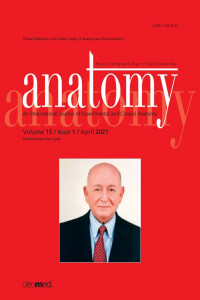Abstract
Objectives: Tissue defects in the lateral triangle of the neck and the anterior cervical region represent a high demand for plastic and reconstructive surgery. Their management most often requires regional or free flaps. The perforator flap based on the deltoid branch of the thoracoacromial artery (TAA) may be a good solution for these indications. The objective of this work is to propose anatomical landmarks to raise perforator flaps pedicled on the deltoid branch of the TAA.
Methods: We carried out dissection of 24 perforator flaps based on the deltoid branch of the TAA, in body donor specimens preserved in a glycerin-rich, formalin-free solution. The TAA was first injected with methylene blue. The vascular territory, location of perforators relative to known landmarks, along with the flap’s potential amplitude and arc of rotation were studied.
Results: The main perforating arteries of the flap were located in the middle of the deltopectoral groove, often surrounded by adipose tissue in 18 out of 24 dissections. In 22 out of 24 dissections, there were at least 2 perforator arteries originating from the deltoid branch. The average diameter of the perforator arteries was 1 mm. The flap’s amplitude of movement made it possible to reach in all cases the lateral triangle of the neck and the anterolateral cervical region.
Conclusion: The thoracoacromial artery has already been used for perforator flaps. However, the individualization of its deltoid branch offers to practitioners new surgical options. This anatomical study of the perforator flap based on the deltoid branch of the TAA made it possible to review the anatomical bases for the raising of this flap, and to fix useful landmarks for the surgeon in order to propose an easily feasible surgical technique.
References
- Ross RJ, Baillieu CE, Shayan R, Leung M, Ashton MW. The anatomical basis for improving the reliability of the supraclavicular flap. J Plast Reconstr Aesthet Surg 2014;67:198–204.
- Alves HR, Ishida LC, Ishida LH, Besteiro JM, Gemperli R, Faria JCM, Rereira MC. A clinical experience of the supraclavicular flap used to reconstruct head and neck defects in late-stage cancer patients. J Plast Reconstr Aesthet Surg 2012;65:1350–6.
- Munnoch DA, Morris AM, Herbert KJ. The deltoid muscle flap: anatomical studies and case reports. Br J Plast Surg 1996;49:310–4.
- Kneser U, Beier JP, Dragu A, Arkudas A, Horch RE. Transverse cervical artery perforator propeller flap for reconstruction of supraclavicular defects. J Plast Reconstr Aesthet Surg 2011;64:952–4.
- Morris SF, Tang M, Almuktari K, Geddes C, Yang D. The anatomic basis of perforator flaps. Clin Plast Surg 2010;37:553–70.
- Manyacka Ma Nyemb P, Fontaine C, Demondion X, Demeulaere M, Descamps F, Ndoye J-M. Anatomical variations of the trunk of origin and terminal branches of the thoraco-acromial artery. MOJ Anat Physiol 2018;5:57–61.
- Geddes CR, Tang M, Yang D, Morris SF. An assessment of the anatomical basis of the thoracoacromial artery perforator flap. Can J Plast Surg 2003;11:23–7.
- Hallock GG. The island thoracoacromial artery muscle perforator flap. Ann Plast Surg 2011;66:168–71.
- Reid CD, Taylor GI. The vascular territory of the acromiothoracic axis. Br J Plast Surg 1984;37:194–212.
- Salmon M, Grégoire R. Artères de la peau (Vol. 4). Paris (France): Masson; 1936. p. 123–31.
- Salmon M, Dor J. Les artères des muscles des membres et du tronc. Paris (France): Masson; 1933. p. 238
- Liu R, Gullane P, Brown D, Irish J. Pectoralis major myocutaneous pedicled flap in head and neck reconstruction: retrospective review of indications and results in 244 consecutive cases at the Toronto General Hospital. J Otolaryngol 2001;30:34–40.
- Wei WI, Chan YW. Pectoralis major flap. In: Wei FC, Mardini S, editors. Flaps and reconstructive surgery. Philadelphia (PA): Saunders; 2009. p. 175–192.
- Nishi Y, Rikimaru H, Kiyokawa K, Watanabe K, Koga N, Sakamoto A. Development of the pectoral perforator flap and the deltopectoral perforator flap pedicled with the pectoralis major muscle flap. Ann Plast Surg 2013;71:365–71.
- Thomas BP, Geddes CR, Tang M. The vascular supply of the integument of the upper extremity. In: Blondeel PN, Morris SF, Hallock GG, Neligan PC, editors. Perforator flaps: anatomy, technique and clinical applications. St Louis (MO): QMP; 2006. p. 129–246.
- Hue E, Gagey O, Mestdagh H, Fontaine C, Drizenko A, Maynou C. The blood supply of the deltoid muscle. Application to the deltoid flap technique. Surg Radiol Anat 1998;20:161–5.
Details
| Primary Language | English |
|---|---|
| Subjects | Health Care Administration |
| Journal Section | Original Articles |
| Authors | |
| Publication Date | April 29, 2021 |
| Published in Issue | Year 2021 Volume: 15 Issue: 1 |
Cite
Anatomy is the official journal of Turkish Society of Anatomy and Clinical Anatomy (TSACA).

